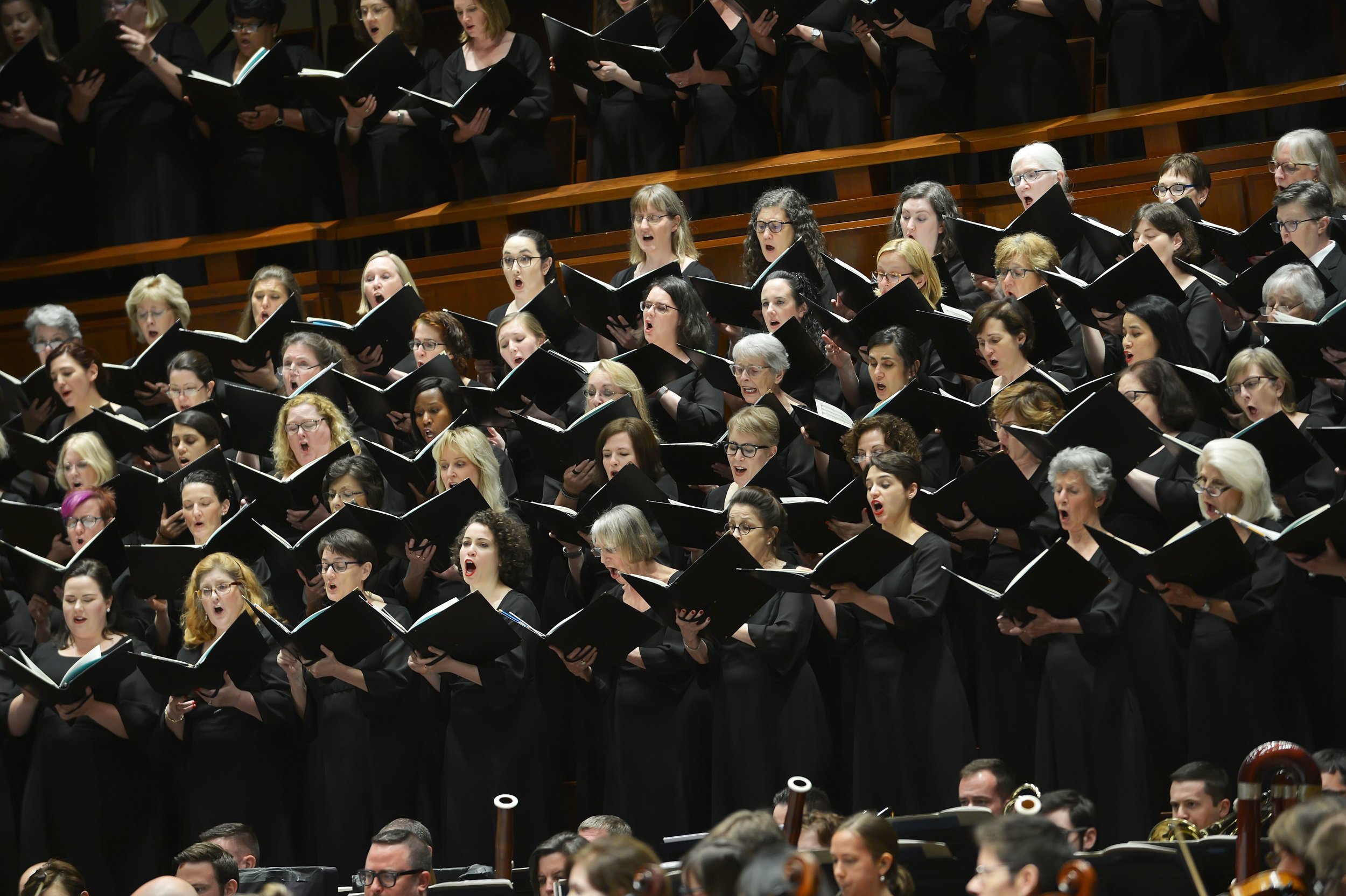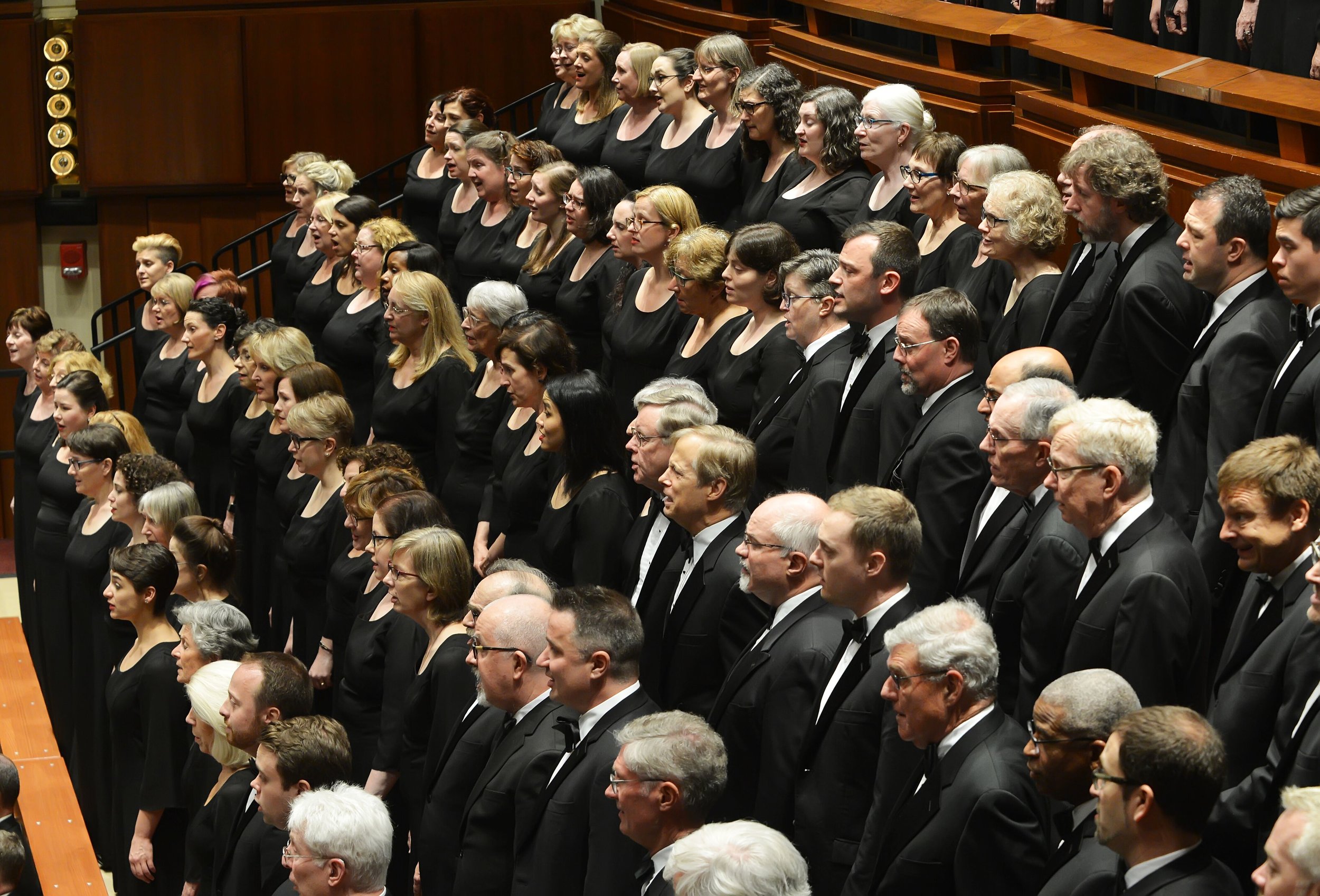Funny that my first trip down to the Kennedy Center to hear The Choral Arts Society of Washington turned out to be the most exciting musical experience of an excellent 2018-2019 season, and perhaps even more remarkable that it was not the piece I went to hear, Gabriel Fauré’s Requiem, that made it so. I looked back at all the musical events I attended this past season and yep, Florent Schmitt’s Psalm 47 (1906), the last item on Sunday’s program, is my number one in terms of excitement, and easily among my favorite performances of the year. Psalm 47 had me on the edge of my seat from beginning to end.
Conductor Scott Tucker facing the orchestra and chorus. Photo by Shannon Finney Photography; courtesy of The Choral Arts Society of Washington.
It turns out that Scott Tucker, Artistic Director for Choral Arts, used the famous Requiem to lure us into the Concert Hall to present Psalm 47 to us, a piece he recently discovered while listening to music on Spotify. Well, when a plan works, it works. Kudos to Mr. Tucker. He also wound the remainder of the program around student-mentor relationships, pointing out how the best mentors inspire their students to pursue their own directions. Third in the program was an orchestral piece, Sarabande (1892) by Fauré’s mentor, Camille Saint-Saëns, and Psalm 24 (1916) by Lili Boulanger was the initial offering. Ms. Boulanger and Mr. Schmitt were both students of Fauré. The musical selections were indeed quite different from one another.
Lili Boulanger was the younger sister of the famous composer, conductor, and teacher Nadine Boulanger. According to Mr. Tucker the younger Boulanger sister is held in higher regard as a composer than her senior sibling. Though she only lived to the age of 24, Lili was awarded the Prix de Rome, which Nadia coveted, but never won. Nadia Boulanger is famous as arguably the most influential teacher of the twentieth century. Psalm 24 is a piece for chorus, organ, and the brass and percussion sections of the orchestra. This first piece was conducted by Brandon Straub, Associate Conductor and Pianist of the Choral Arts; the remaining parts of the program were conducted by Mr. Tucker. The piece is gentle early in praising the Lord but concludes with the organ and chorus going full blast with the exhortation to open the doors and let the King of Glory come in. My secular response to this short piece was okay, that’s good, but what else have you got. Obviously, I will be spending some time on Apple Music searching on the Boulanger name.
Two views of the chorus. Photos by Shannon Finney Photography; courtesy of The Choral Arts Society of Washington.
I knew the Requiem mass by Gabriel Fauré was a highly regarded work, in fact in most people’s top five lists for requiems, and was anxious to hear it. I heard my first Requiem last season, Verdi’s performed as a collaboration of the National Symphony Orchestra, the Washington Chorus, and Choral Arts, and was enthralled. Requiems, meant to be performed to honor someone who has died, have a set structure, that composers take some liberty with. In Fauré’s case, he removed the Dies irae, a poem about the last judgment, that is so striking in the Verdi Requiem, and added the In Paradisum, a section usually not played in church but played as part of the processional moving the casket to the grave site. Fauré did this because his view of death was more a restful slumber and less fire and brimstone. His Requiem has been called ‘a lullaby of death’. Choral Arts presented the final 1900 version that includes the chorus and full orchestra. Baritone Trevor Scheunemann and soprano Laura Choi Stuart sang as soloists in sections of the Requiem. Mr. Scheunemann with a gorgeous baritone voice sang in the Offertoire and Libera me. Ms. Stuart added her colorful soprano voice to the Pie Jesu. The choir and orchestra worked beautifully together. Impressively, the chorus performed this piece by heart; no synchronized page-flipping in this performance. The work was a kinder, gentler requiem than Verdi’s, which is more of a show piece. Very melodic and pretty, Fauré’s Requiem is a piece you can push back and let the waves of pleasant warmth wash over you, sort of a lullaby.
Third in the program was Sarabande by Saint-Saens. The sarabande is a early dance form, one of many that become popular bases for orchestral dance suites. It gave Concertmaster Karen Johnson a chance to shine as violin soloist. She and the orchestra played this charming piece beautifully.
Which brings us to the focal point of the evening, the piece by Fauré’s prize student Florent Schmitt, Psalm 47. Not familiar with the composer or the work, I had no expectations of this piece for chorus, organ, and orchestra which follows a psalm that basically repeats over and over, praise the Lord. It is quite possible that I don’t get the undercurrents in such a psalm. The music provided a great deal of drama, peaceful interludes, and triumphant crescendos. I felt I was witnessing the unfolding of a dramatic story. The middle section included a solo that was sung by soprano Alexandria Shiner, a Domingo-Cafritz Young Artist. For most of the piece she sat motionless, looking both beautiful and rather regal, but when she sang her powerful voice became majestic in a difficult role. The music was complex with atonal shifts heightening the tension. The chorus, organ, and orchestra each had their moments and conversations among them often included unexpected shifts. Yet, it all worked to be interesting, even spellbinding. Overall, it is a thrilling work with a big finish that was performed to the max by Choral Arts. It came across to me as something new, not turn of the twentieth century. Kudos to Conductor Tucker, the chorus, and the orchestra.
Like a lot of people, I developed a love of choral music growing up by hearing it performed in church. You can hear these great works on recordings, but a lot is lost in the translation. I am so glad that I got to hear this performance live. Not only is the sound far superior within the Concert Hall, but the majesty of hearing over 200 hundred performers on stage combining their talents to touch you with their music can only really be experienced fully by being there. I came away impressed with The Choral Arts Society of Washington and looking forward to hearing more of their work.
The Fan Experience: This was the final event for the season for the Choral Arts Society of Washington, but they will return in October to begin their 2019-2020 season, to be found at this link.



